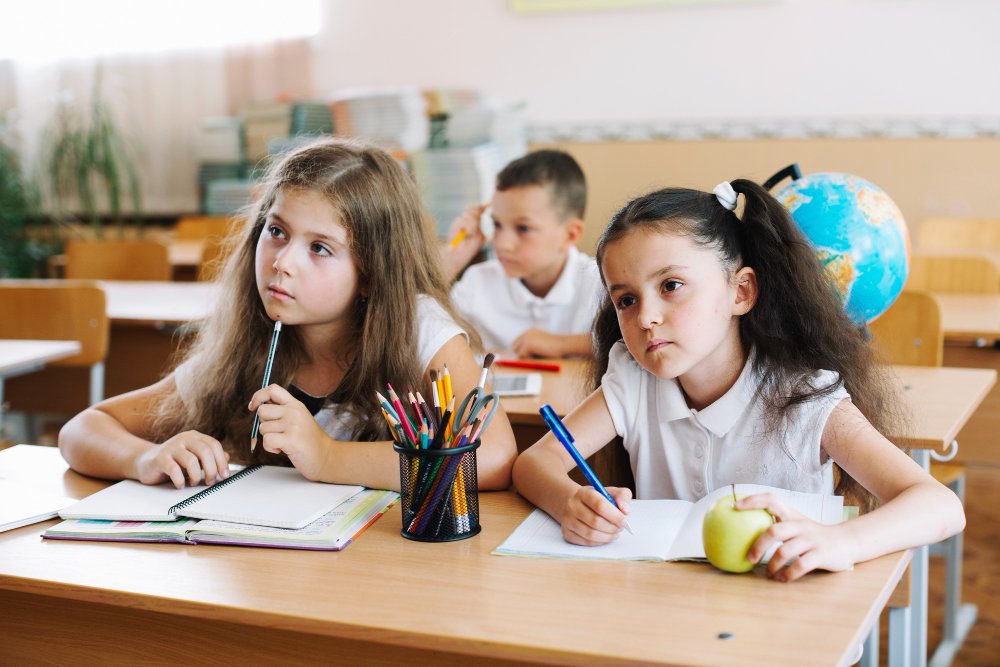Listening attentively is one of the most important skills in today’s world, especially for the young generation, who are brought up in a world full of distractions. Active listening is not just hearing but understanding the message’s meaning, feeling, and purpose. On top of that, this skill helps to develop communication, empathy, and social skills and sets the foundation for education.
In particular, children who study at vibrant and diverse schools of the CBSE board or international schools in Sharjah can greatly benefit from the development of this type of skill. In this blog post, we look at the concept of active listening, why it is crucial, and how adults can encourage its use among children.
What Is Active Listening?
To be more precise, active listening is a communication strategy where a person pays close attention to a speaker to comprehend the information delivered. It involves looking at the other person’s face, giving a head bow in agreement, avoiding the urge to interject, and instead asking questions that will help one verify that one has understood what has been said. It needs focus, understanding, and time.
It is of immense benefit to the development of children when they successfully learn this skill. Active listening in schools where children are engaged in group discussions and collaborative learning improves the understanding of the information communicated, accepting the views of other children and responding appropriately, thus creating an environment of tolerance.
Importance of Active Listening
Active listening is among the many important life skills that have a lot of advantages during the development stages. Below are some of the reasons why active listening should be nurtured in children:
1. Enhancing Communication Skills
It helps children comprehend feelings and purposes beyond words, improving their interpersonal communication ability as they get an opportunity to answer carefully. For instance, CBSE board schools create an academic environment that helps children become more clear and confident in their ideas and thoughts through listening to their teachers and peers attentively.
2. Boosting Academic Success
The ability to take good notes, learn material, participate in class discussions, and engage in student engagement all depend on active listening.
3. Empathy and Understanding
Empathy develops by encouraging children to listen to other children and respect their opinions as they get to hear from them.
4. Strengthening Relationships
Active listening builds trust, appreciation, and respect between individuals and in the group, especially in learning environments such as class, and strengthens friendship, family, and teacher-student relationships.
5. Teaching Children Conflict-Solving Techniques
Listening skills in children improve peaceful conflict resolution, showing empathy and finding solutions, a critical factor in schools and interpersonal and business relations.
6. Improving Critical Thinking
Effective listening skills encourage critical skills and problem-solving skills for children during learning, especially when being taught tough programs like the ones in international schools in Sharjah.
Active Listening Skills: How to Develop Them in Children
For children to develop good active listening skills, parents and educators have a responsibility to provide directions. Here are some practical strategies that can be implemented at home and in school:
1. Lead by Example
Children will emulate the actions of the adults who interact with them most of the time. If parents and teachers listen carefully to the children, look at them, and respond calmly, children will copy them. In any environment, home or classroom, it is always good to model correct listening behaviours to children.
2. Encourage Turn-Taking.
During the conversations, children are also able to learn the importance of waiting for their turn to speak. The same can be applied when having a family dinner or when conducting a classroom discussion. Tell children to wait for their turn before speaking. It is a simple practice that makes one wait and also helps in listening to the speaker effectively.
3. Create a Distraction-Free Environment
In a world where every piece of information calls for attention, especially electronic gadgets, there is a need to set environments that facilitate communication. To reduce the time spent on device usage, set particular periods in a day when children are encouraged not to use any devices and engage in listening and speaking activities.
4. Ask Open-Ended Questions
The use of open-ended questions helps the children to reason and respond more appropriately. When children are asked questions such as “What do you think of this?” or “May I know why you have such thoughts or feelings?” They are made to spend some time to digest whatever they have been told and come up with a proper response. It not only enhances their listening comprehension but also develops their speaking and organising skills.
5. Use Interactive Activities
Listening activities in which learners are actively engaged include games like “Simon Says” or “Story Building,” are perfect for enhancing active listening. These activities can be most effective in the school environment, as they help students entertainingly master certain material.
6. Encourage Reflection and Paraphrasing
Children should be encouraged to put into their own words in their own simple words what they have heard or what has been read to them. For example, after a classroom discussion or a family conversation, end the discussion and ask your child, “Do you want to tell me what you heard?” In this technique, children can grasp what is said and remember the information that has been said.
7. Provide Positive Reinforcement
Children should be appreciated for listening, as this encourages them to the act of listening. It is believed that positive reinforcement can help children practice active listening, for example, when an adult says “well done” or “thank you for listening carefully.”.
8. Active Listening in Schools
Schools in Sharjah also play a critical role in the education of children because of the numerous divergent learners in class, therefore encouraging them to be active listeners. In these schools, listening comprehension plays a critical role in learning and social relationships with peers.
For example, while learning English, communication and social skills are the key concepts in some of the schools, children are encouraged to learn cooperatively and in groups. During such moments, listening should be done actively so that students can grasp various views and be useful in the discussion. Similarly, kids who engage in active listening are better able to retain lectures, comprehend difficult subjects, and do well on exams at CBSE board schools, where academic accomplishment is highly rewarded.
In Summary
A fundamental ability that can greatly improve children’s academic achievement, relationships, and communication is active listening. Encouraging children to acquire this ability is an investment in their future success, whether it takes place at home or in school. Parents and educators can foster attentive and empathic listeners by modelling active listening, establishing distraction-free surroundings, and promoting meaningful replies.




